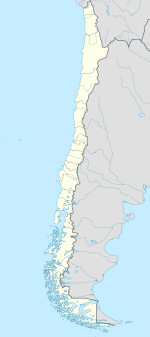Licantén is a town within the Licantén commune, administered by the Municipality of Licantén within the Curicó Province in the Maule Region of Chile. The commune also include the coastal town of Iloca.
Licantén | |
|---|---|
 | |
| Coordinates (city): 34°59′S 72°00′W / 34.983°S 72.000°W | |
| Country | Chile |
| Region | Maule |
| Province | Curicó |
| Government | |
| • Type | Municipality |
| • Alcalde | Héctor Quiero Palacios (UDI) |
| Area | |
• Total | 273.3 km2 (105.5 sq mi) |
| Elevation | 5 m (16 ft) |
| Population (2012 Census)[2] | |
• Total | 6,689 |
| • Density | 24/km2 (63/sq mi) |
| • Urban | 3,974 |
| • Rural | 2,928 |
| Sex | |
| • Men | 3,654 |
| • Women | 3,248 |
| Time zone | UTC-4 (CLT[3]) |
| • Summer (DST) | UTC-3 (CLST[4]) |
| Area code | 56 + 75 |
| Website | Municipality of Licantén |
Demographics
editAccording to the 2002 census of the National Statistics Institute, Licantén spans an area of 273.3 km2 (106 sq mi) and has 6,902 inhabitants (3,654 men and 3,248 women). Of these, 3,974 (57.6%) lived in urban areas and 2,928 (42.4%) in rural areas. The population grew by 8.8% (557 persons) between the 1992 and 2002 censuses.[2]
Administration
editAs a commune, Licantén is a third-level administrative division of Chile administered by a municipal council, headed by an alcalde who is directly elected every four years. The 2008-2012 alcalde is Héctor Quiero Palacios (UDI).[1]
Within the electoral divisions of Chile, Licantén is represented in the Chamber of Deputies by Roberto León (PDC) and Celso Morales (UDI) as part of the 36th electoral district, together with Curicó, Teno, Romeral, Molina, Sagrada Familia, Hualañé, Vichuquén and Rauco. The commune is represented in the Senate by Juan Antonio Coloma Correa (UDI) and Andrés Zaldívar Larraín (PDC) as part of the 10th senatorial constituency (Maule-North).
See also
editReferences
edit- ^ a b "Municipality of Licantén" (in Spanish). Archived from the original on 21 March 2009. Retrieved 20 January 2011.
- ^ a b c d "National Statistics Institute" (in Spanish). Retrieved 20 January 2010.
- ^ "Chile Time". WorldTimeZones.org. Archived from the original on September 11, 2007. Retrieved 2010-07-28.
- ^ "Chile Summer Time". WorldTimeZones.org. Archived from the original on September 11, 2007. Retrieved 2010-07-28.
External links
edit- (in Spanish) Municipality of Licantén


